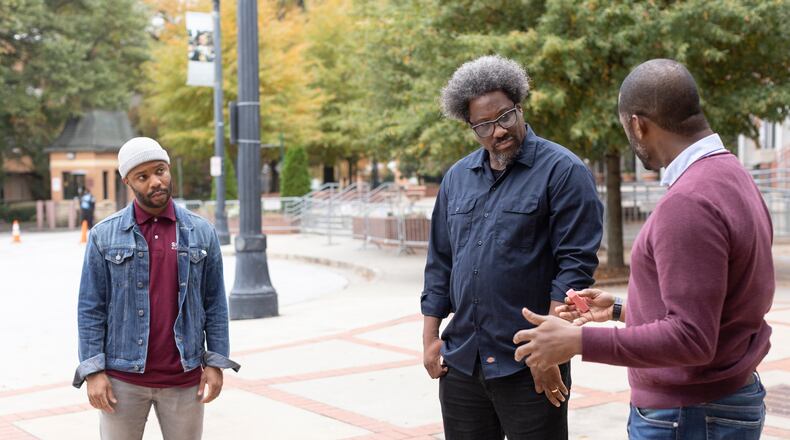Comedian and social activist W. Kamau Bell managed to shoot seven more episodes of his Emmy-winning CNN series “United Shades of America” during a pandemic, doing nearly all his interviews outdoors, maskless.
“The real miracle is I’m not dead,” said Bell, with his signature chuckle. “I didn’t get COVID. I’m like a walking comorbidity. I’m Black, in my 40s. I have asthma and high blood pressure. COVID was lurking at every turn. It was frightening. I will give it to the production company. I survived. They tested me every day. My nose has no feeling inside but I don’t care.”
The series returns for its sixth season at 10 p.m. Sunday.
Because of the pandemic, Bell said the camera crew couldn’t be as spontaneous about where to shoot as it normally did in the past. So if a particular location wasn’t working, they had to make it work. Plus, he found sitting on hard outside benches and chairs for long periods less than idyllic compared to comfy indoor couches.
After the George Floyd protests broke out last year, Bell decided to revisit policing in America, a topic he delved into in season one in 2016. And for the second time, CNN is giving him an extended episode that goes beyond an hour. In it, he interviews activists, organizers, politicians, victims and police themselves in his hometown of Oakland, California, and the Bay Area.
“We could have picked anywhere for a policing episode,” Bell said. “This was earlier during the pandemic and I already knew a lot of the activists and organizers. I was able to book that episode off my contacts in my phone. Plus, people around here know my reputation. They were down to talk to me.”
The episode revolved around digging behind the slogan “defund the police,” which he said often causes people to “reach for the fainting couches.” He admits he was initially taken aback by the phrase himself, but wanted to educate people about how the police have eaten up huge gobs of city budgets without necessarily commensurate results. Activists argue that some of that police money could be diverted so cops no longer have to rouse the homeless or deal with mental health and drug issues so much.
Credit: AUNDRE LARROW
Credit: AUNDRE LARROW
Bell also explores Afrofuturism and the need for more Black people to get into science and math in his first-ever episode spent entirely in Atlanta. (This episode is set to air May 9.)
“CNN is in Atlanta,” he said. “CNN doesn’t want me to go places they know about. Atlanta isn’t exactly unknown territory for them.”
But Atlanta is home to a rising number of tech companies and Bell was able to interview an array of experts, including Morehouse College academics Nathan Alexander and Brian Garrett, computer scientist Brandeis Marshall, comic book creator Dedren Snead and Mutale Nkonde, founder of AI For the People, which seeks to eliminate under-representation of Black professionals in the tech field.
And Bell was thrilled to meet another man with his first name: Kamau Bobb, an expert in the drive to achieve equity in STEM education.
Bell is grateful he has been able to work the past two seasons with Zero Point Zero Productions, the same company that did the late Anthony Bourdain’s award-winning travel shows.
“The level of research and thoughtfulness and artistry they put into each episode is astounding,” Bell said. “A lot of people who do this work for my show have been there for a long time. I’m always excited to see them do things in a different way.”
The Atlanta episode, for instance, is packed with comic-style graphics of successful Black inventors and the amazing story of “Star Trek” actress Nichelle Nichols planning to quit the show until Martin Luther King Jr. convinced her not to.
And Bell’s good-natured humor shines through. During a virtual reality demonstration, he notices his digital hands are white, the default setting of the game. Later, while narrating over 1950s-era science education footage, a creepy image of a growing white hand allows Bell to do a callback joke from the earlier scene.
Bell said when he first began the show, he just felt like some lucky dude traveling the country. But he now feels responsibility as a Black man to have a point of view and ensure that “everything we show is clear and exact and I’m owning the things that are my opinions versus things that are empirically true. The show can’t ever come across as, ‘Who knows what the truth is?’ We are always driving toward the truth.”
He said the show began under the Barack Obama presidency but by season two, Donald Trump was in office: “The aftereffects of that were being felt by everybody in the country and put a different level of intensity on the show and turned the heat up on us.”
Of the six episodes this season, the one he thinks viewers may potentially find most compelling is the one focused around military veterans. It contends that the military apparatus isn’t quite as supportive of them as you may think.
And he said the episode about the transgender community is not depressing, despite all the anti-trans bills in state legislatures: “There is a ton of laughter and beauty. It’s a lot more fun than you’d expect.”
WHERE TO WATCH
“United Shades of America,” returning for season 6 at 10 p.m. Sunday, May 2, on CNN
About the Author
Keep Reading
The Latest
Featured




